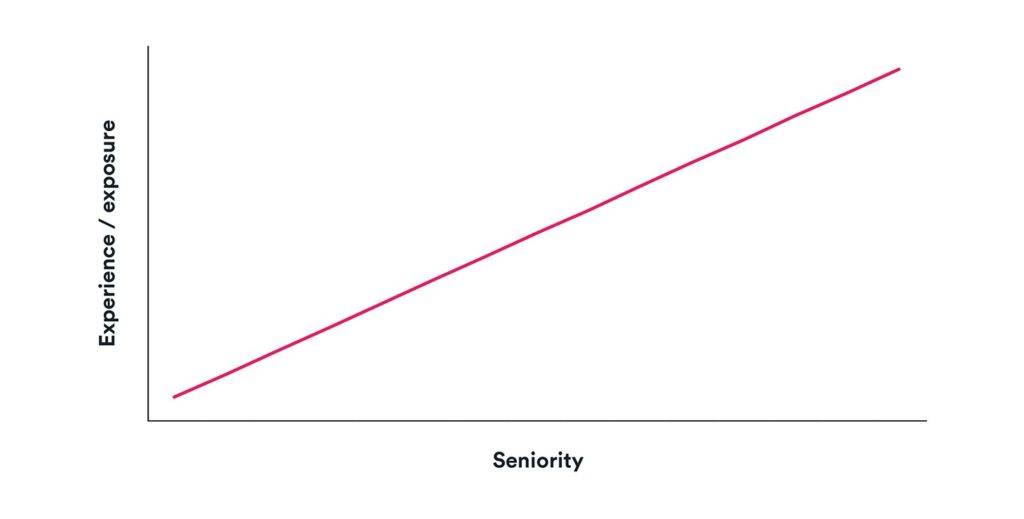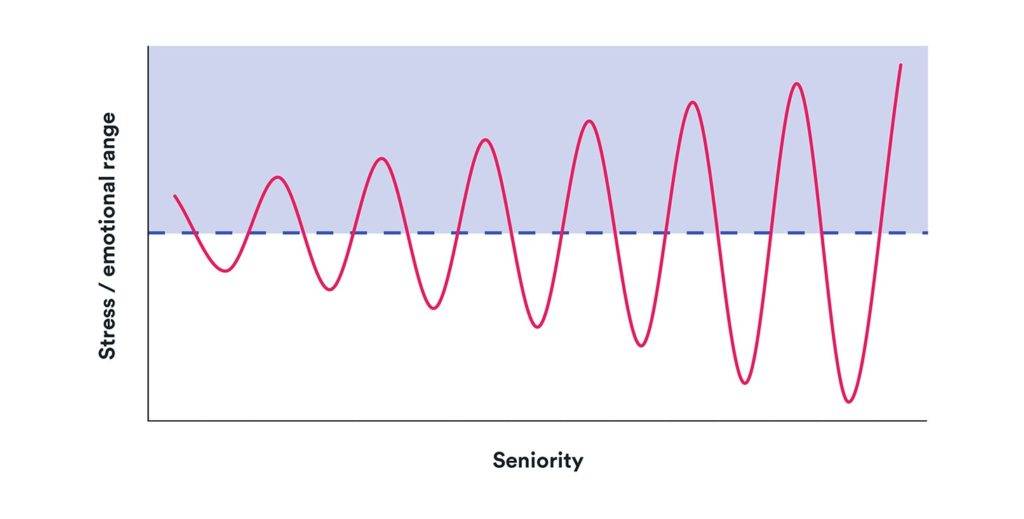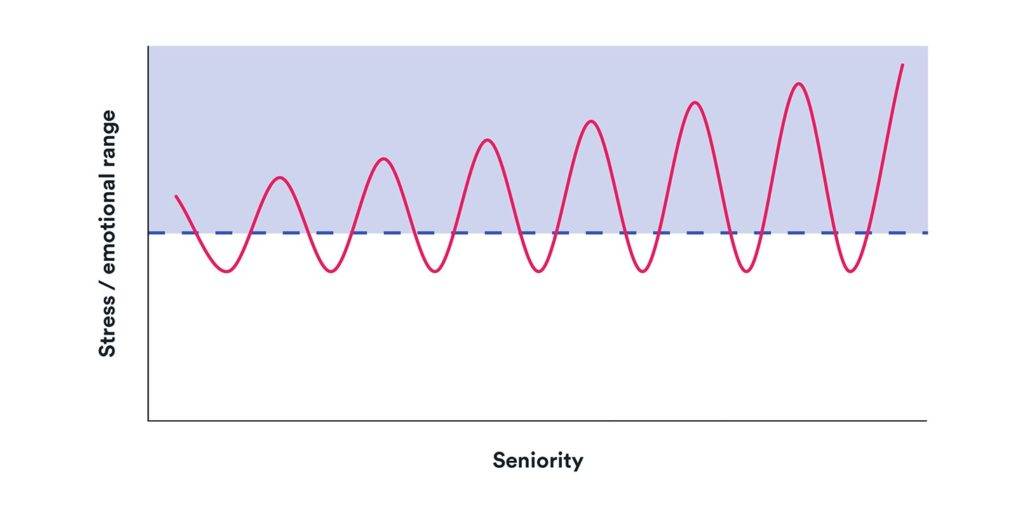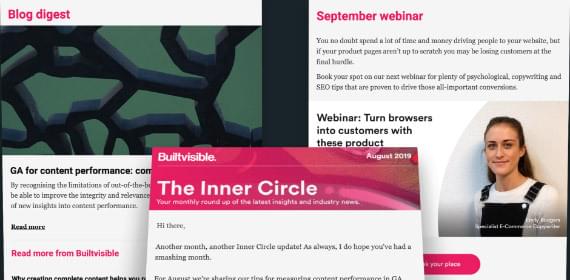Scene setting: The challenges of agency life
Agency life isn’t for everyone, and that’s absolutely fine.
To some “fast-paced” is a term used to euphemistically paper over the cracks of agency environments that miss the mark on management, work their employees to the bone and generally put profit before purpose.
To others however, the exact same phrase represents the opportunities brought about through exposure to a wide variety of clients and projects, rising to unexpected challenges and being a part of something bigger than themselves.
Agencies with the right environment are undoubtedly great places for people in the latter group to progress and build a career. Unlike other professional services, you can’t gain qualifications for SEO, it is something you learn by doing, and for those that seek it, the exposure to and navigation of the constant variety of challenges a good agency provides rapidly accelerates experience and therefore seniority in a pretty linear way.
If one were to draw a rough graph to represent this idea it might look something like this.

(these charts are for illustrative purposes only)
But alongside this, outside of the actual services people are employed to deliver, runs an emotional/psychological sine-wave where, as the scale of potential emotional highs and dopamine kicks increase, the downsides do so in-line. Furthermore, the experiences of successfully navigating tricky situations are the exact things that directly feed and magnify the highs.

The ultimate aim of any management team should of course be to increase the highs and ensure the stresses remain minimal.
The reality however, is that creating an agency environment (or any workplace for that matter) where the chart resembles something like the below – with all of the highs and none of the lows, are simply slim to none.

This is an uncomfortable truth any leader of a scaling/growing people-based business needs to understand, accept and crucially, act upon. To ignore, deny or gloss over is to under-serve employees and ultimately shoot yourself in the foot in the long-term through burn-out, toxicity and attrition.
We put enormous amounts of focus on work-life balance, sensible resourcing, flexible working etc. (as I’m sure many agency senior leadership teams do) but these alone do not assist an individual’s ability to actively tackle the inevitable internal challenges that come with progression.
For employees and candidates this reality is in perpetual danger of being masked by “added value” perks that focus purely on the upsides above the horizontal line in my graph. Obviously these are great, and all part of the agency experience, but having explored options to take below this line seriously we found many options were pre-packaged and engineered for benefit lists, as opposed to genuine provision integrated with our business’ specific processes and frameworks, tailorable to each individual regardless of needs and crucially, backed by medical science.
What we’ve done
Taking all the above into account, along with a few test-and-learns with various providers, we took the decision back in 2020 to embed Clinical Psychologists into our agency teams to support our people on two fronts; reactively and proactively.
Reactive provision
Dedicated expert support to triage, signpost or treat as required acute mental health issues that arise either in our outside of work.
While our private healthcare benefit does include mental health support and the traditional routes via the NHS are always an option, there is always a degree of friction getting in front of the right person. Having highly qualified provision within arm’s reach provides both peace of mind as well as incredibly effective primary care.
Proactive provision
Proactive provision represents the growth side of mental health. Integrated directly into Career Architect, our unique career progression framework, our psychologists work directly with individuals and teams to navigate the challenges of their roles or career head on.
From building resilience and regulating emotions to leadership and communication skills, we are able to provide clinically-backed support that enables and empowers our people to increase self-awareness, take control of their progression and grow as human beings.

Why Clinical Psychological support needs to be the norm in agencies
Fundamentally, I believe embedding this level of support in any high performance environment is a no brainer. We are seeing it more and more in the world of elite sport as part of the quest for the 0.1% that might be the difference between winning and losing, and I see it as one of the biggest no-brainers in corporate leadership.
At the very least it provides a level of safeguarding for the biggest asset an agency has – it’s people. At the other end of the spectrum there is a huge, untapped potential for growth that no-one in agency land really understands yet.
Builtvisible is proudly independent and unashamedly specialist, meaning partnering with clinicians (in our case The Core Collective) as opposed to the more corporate providers is a great cultural fit. I know we are paying for the best care possible, not marketing and other operational overheads.
In terms of this care, there are four standout differentiators that Clinical Psychologists bring far above and far beyond other types of mental health provision:
They are highly qualified
Becoming a Clinical Psychologist requires at least 6 years at university, passing a number of bars and extensive clinical experience. Compared to the minimal entry requirements in other fields such as coaching or counselling this guarantees we are delivering exceptional, very highly qualified, evidence-based support to our team.
They are highly regulated
Again unlike many other disciplines, you can’t just called yourself a Clinical Psychologist. The title is legally protected, meaning only those meeting strict criteria set out by the Health and Care Professions Council may use it.
Once qualified, Clinical Psychologists are also required to undergo supervision, meaning their work is peer-reviewed constantly and standards remain exceptional. Again this is not a legal requirement for many in the corporate wellness space.
They bring breadth of approach
Clinical Psychologists do not just use one modality – they have a highly specialised toolbox consisting of multiple therapy bases that can be adapted to suit the individual on clinical reasoning, rather than having to stick to one approach.
In a digital agency like ours with so many different personality types, professional challenges and personal circumstances across the teams, the ability to adapt massively trumps the one-size-fits-all approach in terms of effectiveness.
They are embedded in mental health systems
The pathway to becoming a Clinical Psychologist requires experience in a range of settings, meaning they know the support system fits together as a whole, outside of Builtvisible.
Therefore, if an acute issue requires a referral somewhere else for on-going or more specialist care, they are able to make a clinical judgement and help the individual navigate external systems such as the NHS or issue-specific charities.
To the uninitiated, these systems are incredibly complex and convoluted, so this expertise is of enormous benefit for people who need the right help, quickly.
How has this approach benefited Builtvisible?
We’ve been running our program of clinical mental health provision since 2020 and have seen a wide-ranging impact across the operations of our agency.
It goes without saying the past couple of years have been tough for everyone, and the ease with which people can access expert clinical support for acute issues both within or outside of work, has been invaluable for a number of our team.
On the proactive side we have also used the evidence-based approaches the Core Collective provide to help individuals work on aspects of their approach such as perfectionism, focus and imposter syndrome (to name just a few) that have otherwise been holding them back in their career.
We have also tackled some big challenges at scale such as:
- Running team and group workshops on tackling issues commonplace in digital/SEO agencies
- Supporting both teams and individuals in their return to “normal” work/life post-covid
- Scoping and rolling out a range of periodical wellness trackers for managers to use with their team as and when relevant
- Becoming a clear escalation point for managers in situations where they are not qualified to deal with an arising issue in their team/pod
- Looping learnings back into Career Architect to refine hiring process, assessment criteria and support requirements for every role in our agency
Finally, and this sounds counter-intuitive, but the very fact we work with experts from well outside of the SEO agency bubble means the way all of these learnings get fed back into the business from a purely objective, clinical standpoint.
Our challenges as a leadership team then become to translate these observations, patterns and themes into processes and frameworks that tackle them at an organisational level. It is a perfect example of horses for courses.
Clearly, I am incredibly passionate about the approach we have taken from both a duty of care standpoint, as well as the growth potential I believe we are injecting into our people and therefore our agency.
If you’re an agency leader looking to solve similar challenges feel free to drop me a line, I’d be very happy to talk through our journey to date in more detail.
If you’re interested in seeing how the Core Collective can help your business, I’m sure they’d be happy to chat.
